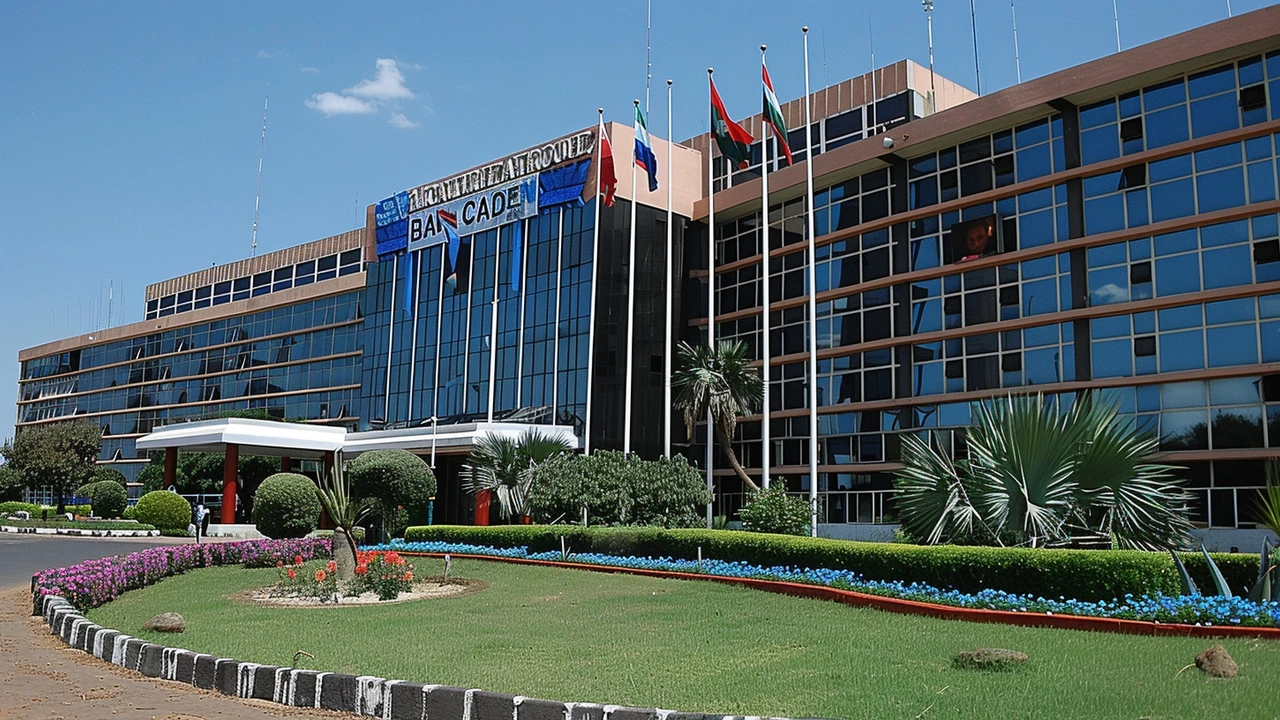Kenya Reiterates Commitment to Menstrual Health on Menstrual Hygiene Day
On May 28, 2024, Kenya once again declared its unwavering commitment to improving menstrual health and hygiene nationwide, echoing the global observance of Menstrual Hygiene Day. During this announcement, the Principal Secretary at the State Department of Public Health and Professional Standards, Mary Muthoni Muriuki, underscored the critical importance the government places on creating an environment where women and girls can manage their menstruation with safety and dignity.
Government’s Dedication to Menstrual Health
Mary Muriuki highlighted that while strides have been made in improving menstrual health in Kenya, numerous challenges still persist. Addressing these issues demands sustained support and comprehensive initiatives. The government's approach focuses on several key areas: providing accurate and comprehensive information on menstruation, promoting accessible and affordable high-quality menstrual products, and implementing sustainable practices for menstrual waste management.
One notable strategy involves collaboration with international organizations, including USAID and UNICEF, to aid the implementation of the Menstrual Hygiene Management (MHM) policy at the county level. These partnerships aim to bolster local efforts and ensure that initiatives reach every corner of the country. The theme for the year, 'Making Kenya Period-Friendly,' encapsulates the goal of ensuring that every woman and girl can manage their menstruation with dignity and without facing undue hardship.
Key Initiatives: Education and Product Access
Providing accurate information to all segments of the population is crucial. By disseminating knowledge about the biological processes involved in menstruation and breaking down the cultural taboos surrounding it, the initiative hopes to foster a more understanding and supportive community. Schools are pivotal in this educational push; integrating menstrual education into the curriculum ensures that both boys and girls learn about this natural process early on, which normalizes menstruation and reduces stigma.
Furthermore, access to menstrual health products remains a critical area of focus. Despite legislative measures, many Kenyan girls and women still face barriers in obtaining these essential items. The disparity is especially stark in rural and marginalized communities where economic constraints compound the difficulty. The government’s pledge involves not just making products available but also ensuring their affordability. Innovations such as reusable menstrual products and community-based production units offer promising solutions to bridge this gap.
Sustainable Practices and Hygiene
Another pillar of the government’s strategy is managing menstrual waste responsibly. As the use of disposable products increases, so does the burden on waste management systems. Sustainable practices, including the promotion of reusable products and the establishment of efficient waste management mechanisms, are central to this endeavor. The goal is to create systems that manage menstrual waste without harming the environment while maintaining public health standards.
Challenges and Research Findings
The 2016 research sheds light on the profound challenges that continue to beset Kenyan women and girls. Limited access to menstrual hygiene products is often linked to risky behavior and adverse physical and mental outcomes. The lack of adequate Water, Sanitation, and Hygiene (WASH) facilities in schools is another significant hurdle. Poor infrastructure affects educational outcomes, as many girls miss school during their menstrual periods, thereby impacting their academic performance and future prospects.
These findings underscore the importance of comprehensive MHM policies that address various facets of menstrual health. An effective policy ensures not just the availability of products but also the creation of an enabling environment where stigma and misinformation no longer hinder women's and girls' rights to health and education.
Impact of the MHM Policy
Since the launch of the Menstrual Hygiene Management (MHM) Policy in May 2020, there has been substantial progress in integrating MHM into various government initiatives. These efforts signify a multi-sectoral approach involving health, education, and social services. By embedding MHM into existing frameworks, the policy aims to create a holistic response to the menstrual health challenges faced by Kenyan women and girls.
Additionally, the focus on county-level implementation highlights the need for localized solutions that cater to the unique circumstances of different regions. This decentralized approach ensures that interventions are context-specific and more effective. Counties are encouraged to set up multi-stakeholder implementation teams to oversee the successful execution of MHM strategies.
Moreover, partnership with global organizations provides technical and financial support, reinforcing the sustainability of these initiatives. The collaboration fosters knowledge exchange and encourages the adoption of best practices proven effective in other parts of the world.

Conclusion
Kenya’s commitment to improving menstrual health and hygiene marks a significant step towards gender equality and the empowerment of women and girls. The government’s pledge, combined with international partnerships and community-level initiatives, aims to create an inclusive environment where menstruation is managed with dignity and safety. As the world observes Menstrual Hygiene Day, Kenya’s proactive stance serves as a beacon of progress and hope. The journey forward involves addressing the persistent challenges through sustained effort, innovation, and community involvement to ensure every woman and girl in Kenya can thrive without menstruation being a barrier.



manohar jha
May 29, 2024 AT 04:25This is actually huge. In my village in Bihar, girls still use old cloth and hide it like it's shameful. Kenya's approach? Pure wisdom. Education first, then products, then waste. Simple. Real.
Hemlata Arora
May 29, 2024 AT 07:26While commendable, this initiative appears to be more performative than substantive. The government's rhetoric is polished, yet the infrastructure remains inadequate. One cannot legislate dignity without allocating adequate funds.
Nitya Tyagi
May 30, 2024 AT 12:07I'm not surprised... again, another country with 'progress' that only exists on paper. Girls still miss school, products are still unaffordable, and no one talks about how the *men* still whisper and laugh. It's all just... performative activism. 😒
Sanjay Verma
May 31, 2024 AT 08:04Interesting that they're partnering with UNICEF and USAID. I wonder if they're using the same reusable pad designs from Bangladesh? Those have a 90% retention rate in rural areas. Maybe Kenya could adapt them?
surabhi chaurasia
June 2, 2024 AT 07:48This is so wrong. Periods are natural. Why are we making a big deal? Girls should just be quiet and tough. No need for all this fancy policy stuff.
Amresh Singh knowledge
June 2, 2024 AT 19:17The decentralized county-level implementation is a smart move. One size does not fit all. In Uttar Pradesh, we've seen similar models work when local leaders were empowered to adapt solutions to tribal and agrarian contexts.
Rahul Madhukumar
June 3, 2024 AT 19:39Yeah right, 'period-friendly'. What about the men who still think periods are dirty? You can't fix this with pamphlets. You need to burn the old mindset. And stop wasting money on foreign NGOs. Kenya should do this on its own.
Khushi Thakur
June 3, 2024 AT 20:52There is an existential weight to menstruation that modern policy frameworks fail to acknowledge. It is not merely a biological event but a metaphysical rupture in the social fabric-yet we reduce it to product distribution and infrastructure. We sanitize the sacred, and call it progress. 🌙
Varad Tambolkar
June 5, 2024 AT 00:15USAID? UNICEF? This is cultural imperialism. Who gave them the right to tell Kenya what to do? This is just another way to control African nations under the guise of 'help'. And what about the Chinese companies supplying the pads? Are they secretly tracking data? 🤔
Vijay Paul
June 5, 2024 AT 20:17Solid move. This is the kind of policy that actually changes lives. Not just headlines. I hope other African nations take note. Progress isn't loud-it's quiet, consistent, and rooted in local needs.
RUPESH BUKE
June 7, 2024 AT 12:12Good to see the focus on reusable products. Waste is a real issue. We need more local production. Simple. Cost effective. Sustainable.
Chirag Kamra
June 7, 2024 AT 23:27OMG YES!! Kenya’s doing it right!! Reusable pads, school edu, no more hiding!! I wish we had this in my town-my cousin missed 3 weeks of school last year bc she had no pads. This is life changing 💪✨
Ramesh Velusamy
June 8, 2024 AT 11:58This is the kind of thing that turns girls into women who believe they matter. No more shame. No more skipping school. Kenya’s showing the world how to do it right. Keep going!! 🙌
Sushil Kallur
June 9, 2024 AT 18:43I appreciate the cultural sensitivity in the approach. Too often, these programs ignore local beliefs. Kenya seems to be walking the line between modernization and tradition. That’s rare and valuable.
Chandni Solanki
June 10, 2024 AT 17:35This made me cry. I remember hiding my pad in my school bag like it was contraband. Seeing this happen in Kenya? It feels like the world is finally waking up. ❤️
Nitin Garg
June 12, 2024 AT 01:55Oh wow, another 'period empowerment' campaign. Next they’ll be giving out trophies for not missing school. Meanwhile, real problems like food insecurity and clean water? Ignored. Priorities, people.
Seema Lahiri
June 12, 2024 AT 06:31I think what’s really important here is how the policy connects menstrual health to education outcomes and mental well-being. It’s not just about pads or toilets, it’s about letting girls grow up without the constant fear of being exposed or humiliated. That silence they carry? It’s heavy. And this policy? It’s trying to lift it, slowly, quietly, but it’s trying.